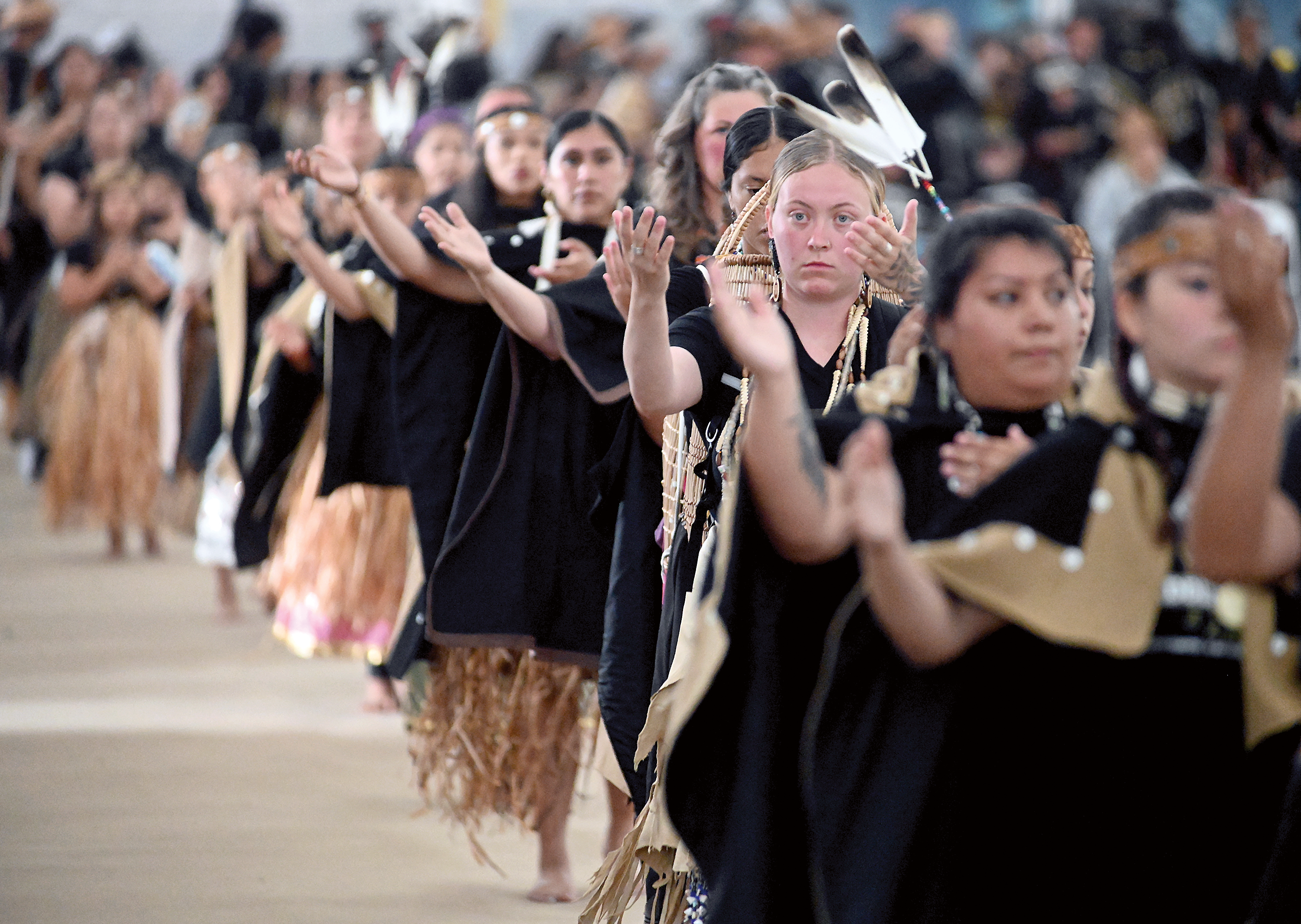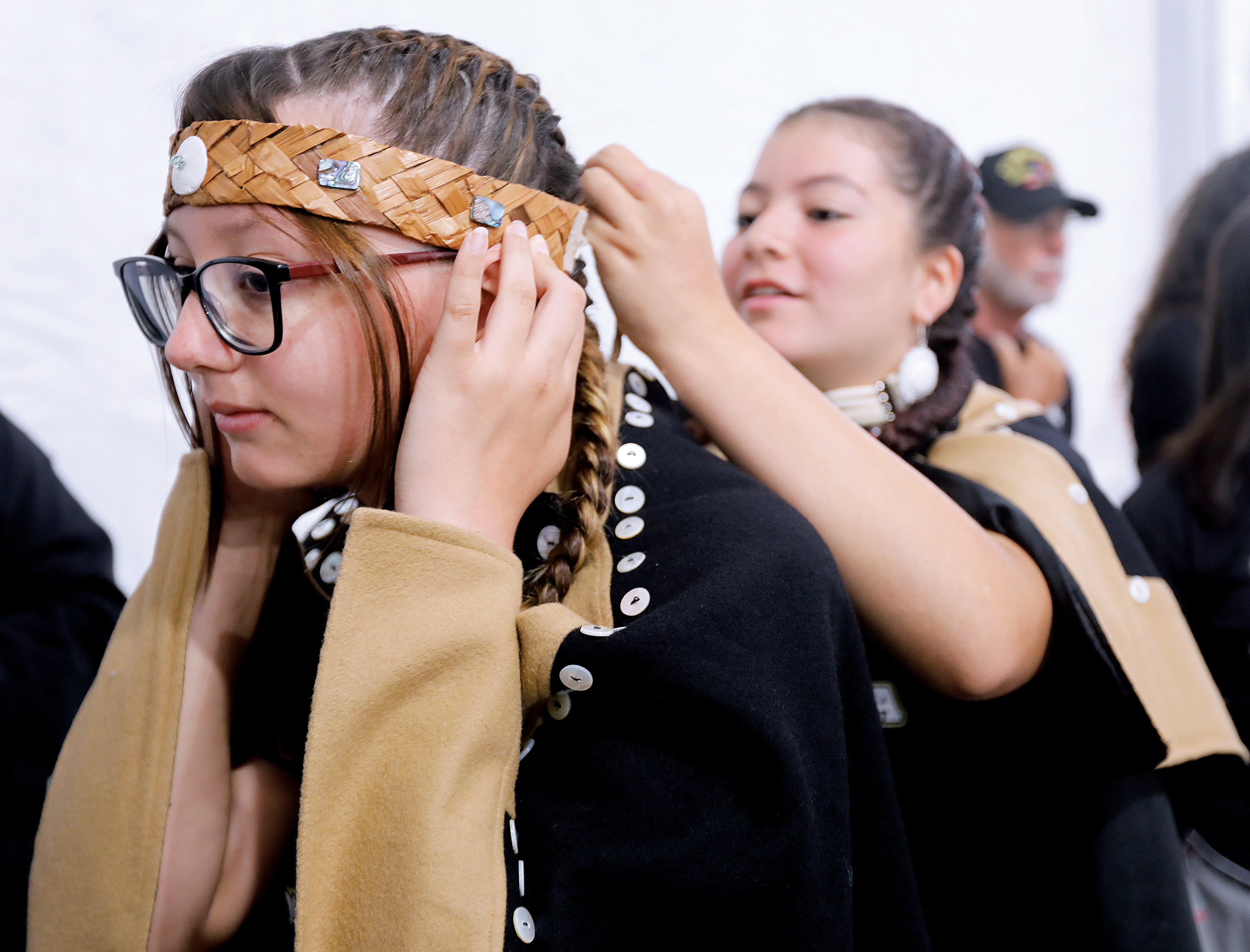Culture
Canoe Journey takes unexpected turn when tsunami hits

By Nicole Montesano
Smoke Signals staff writer
PORT ANGELES – The Paddle to Elwha 2025 Canoe Journey took an unexpected turn this year, after a massive 8.8 magnitude earthquake rattled the Kamchatka Peninsula in Russia on Tuesday, July 29, with global consequences. Tsunami waves a foot or more high reached as far as Oregon and Washington.
Water conditions were so rough in the following days that Grand Ronde and several other canoe families decided to forgo the final paddle to the Landing Day ceremony Thursday, July 31. Instead, practicing for protocol in camp occupied a morning people had expected to spend on the water, although some went to watch the canoes that had decided to brave the weather coming in. Some canoes had to be towed across the final stretch and one capsized.
This year’s Canoe Journey was hosted by the Lower Elwha Klallam Tribe and landing day had been scheduled to take place at the mouth of the Elwha River near Port Angeles, Washington. Grand Ronde first participated in the annual event in 2005, with just a handful of Tribal members and youth. Then called the “Healing and Unity Journey,” it was also hosted by the Elwha Tribe. Twenty years later, Grand Ronde participation has grown to more than 100 in attendance, often with entire families instead of just Tribal youth.
After a tsunami advisory was issued on Tuesday, July 29, families and supporters scrambled to pull canoes up to higher ground before the first waves were expected to hit that evening, sending out calls on social media to those camped farther away, asking if they had permission to move their canoes as well. Experts noted that even small tsunamis can create strong currents or dangerous waves and can continue for as long as 15 hours after the initial wave.
Rough sea conditions continued over the next two days and some Canoe Families pulled out at that point.
“After the tsunami, that was just kind of a turning point, and this water is always challenging, even without that,” Tribal Social Services Manager Dana Ainam said.
This year’s journey proved more adventurous than expected, she said, noting that there was no cell service at some camp sites, making getting the word out about the tsunami more challenging.
Grand Ronde forgoes Landing Day
Tribal Cultural Advisor and Skipper Bobby Mercier said that after he attended the skippers’ meeting Wednesday, July 30, the group decided not to proceed.
“The chair was advising not to go out and sent us all the logistics on what’s going to be happening, and we were just like, ‘No way. We’ve been in that before. We’re not going to go,’” Mercier said.
The final pull was expected to take eight or nine hours, in a strong current with high winds and possible fog. Participating canoes were “highly encouraged” to leave by no later than 6 a.m., to avoid the worst weather.
“Please be careful and don’t underestimate the west wind,” a message from the Jamestown Support Boat Captain warned. “It will be 20-25 mph by mid-afternoon and it will get pretty rough.”
“And sure enough, there’s all these canoes getting towed out there; they’re getting like 3- to 4-foot chops at ‘em, white caps just blowing wind and rain in their face,” Mercier said. “A bunch of the people that were on the support boats were getting calls over here at the next camp, to come down and pick up a bunch of the kids because they’re getting seasick out there from being tossed around for six hours.”
Declining to go out in those conditions was in keeping with Tribal tradition, he said.
“Our ancestors didn’t travel when there was bad days,” Mercier said. “They said, ‘Well, we’ll camp for one more night and maybe it’s better tomorrow.’ But to put a timeline on stuff, where it says ‘Listen, you have to be in the water today’ … Our people didn’t travel like that, and we’re not going to do it either. If that weather is bad, we’re not going to take our kids and our families out in that. And so, we’re all here, we’re all safe and yeah, we’re good.”
Mercier noted that there would be a second landing the following day.
“There will be another landing there tomorrow, because canoes are expected from Canada tomorrow; they’re expecting I think 30 canoes,” he said.
However, he said, the site canoes were being invited to launch from was small and crowded.
“A lot of rigs, a lot of people, a lot of canoe trailers trying to spin around down there and maneuver, and that’s just asking for an accident,” Mercier said. “Our biggest thing was, we were invited to be here, to potlatch with these guys, to come here and be part of their big to-do, and we’re here. Our canoes are here.”
The Tribe spent a more relaxing morning singing, drumming and dancing in practice for their protocol ceremony that took place Saturday, Aug. 2.
Protocol typically begins with the Tribe who traveled the furthest to participate in Canoe Journey and includes introductions, singing and dancing. The entire ceremony can last several days.
Participants reflect on experience
Tribal Elder Kimberly Contreras, who said she’s been participating in Canoe Journey for around 16 years, reflected the general pragmatic mood about the decision.
“It’s better to be safe than sorry,” she said. “The seas were really rough this morning.”
She noted that videos showed canoes being towed to shore amid heavy waves.
“It’s totally dangerous,” Contreras said.
She said she’s happy to see participation in Canoe Journey continuing to grow, noting a comment from a friend of hers that more families are participating as a whole, “instead of just sending their youth.”
Tribal Council member and Tribal Elder Brenda Tuomi said she “thoroughly enjoyed” participating in journey this year, noting that she was the oldest member in her canoe.
“It’s still great to just sit there in the canoe, with everybody around you,” she said. “You can’t see the people behind you, but you can hear the paddles hitting the water and the conversations. It’s an honor to come in and ask for landing at each camping site along the way. I love to see the little ones paddling along with the adults as they come by.”
Tuomi watched the landing ceremony for those canoes that decided to brave the conditions.
“It’s emotional to watch, it’s beautiful,” she said. “Everybody working together and paddling and having this common purpose.”
Tribal member Gracie Mercier, participating in her second Canoe Journey, was also philosophical about the ending, saying she had enjoyed the experience.
“I pulled two times,” she said. “It was pretty good. The first time was easier. The second was the longest and hardest I had ever done, but talking to other people, they said it was not too bad.”
She said she was “not too upset about” forgoing landing because she had experienced the ceremony at the earlier stops.
“And I know I’ll get to see it again in the future, and we’ll get to see other Tribes, so I’m not too bummed,” she said.
The 2026 Canoe Journey will be hosted by the Nisqually Indian Tribe near Olympia, Washington.


Sam Hedrick, 14, gets help from Samara Perez, 14, putting on a cedar headband while preparing for the Grand Ronde Canoe Family’s protocol during the Paddle to Elwha 2025 Canoe Journey in Port Angeles, Wash., Saturday, Aug. 2. (Photo by Michelle Alaimo)
